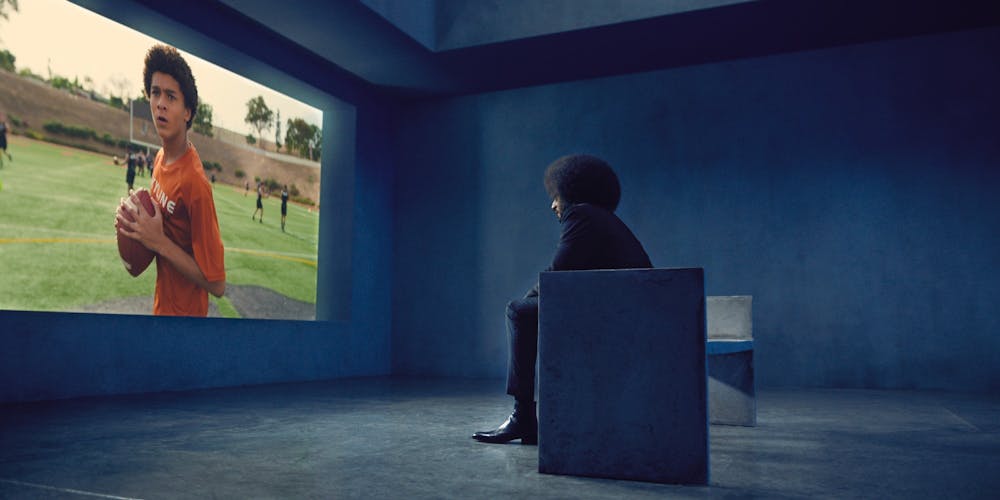In his new Netflix series, “Colin in Black and White,” Colin Kaepernick addresses the microaggressions he experienced growing up with white adopted parents and what he described as modern day slavery within the NFL draft.
Kaepernick is a former NFL quarterback, playing six seasons for the San Francisco 49ers. He was successful in his career until he took a knee for the national anthem during a preseason game in 2017 to protest against racial injustice and police brutality.
In the first episode, Kaepernick addresses the flaws within the NFL draft. In the opening scene, football players are lined up on the field in front of scouting coaches.
Then the next scene shows those same players dressed in chains and shorts, resembling what slaves wore.
Black Voices: Black first generation college students share struggles, success stories
According to Statista, in 2019, 58.9% of players in the NFL were Black, as of 2020 that percentage has grown to 70%.
“Before they put you on the field, teams poke, prod and examine you searching for any defect that might affect your performance," Kaepernick said. "No boundary respect. No dignity left intact."
IU senior Latrease Johnson saw what Kaepernick was trying to prove, but his analysis seemed to fall short.
“I do see how it is similar in practice in how the coaches scout in comparison to slavery,” she said. “However, slaves weren’t offered million-dollar contracts to do the work.”
IU junior Kasee Ellison also agrees. “Slaves didn’t have the desire to wake up and want to work in the fields, get taken away from their families or be mistreated,” she said.
But Ellison can see being a slave and being a Black football player is comparable.
“When choosing who’s best fit, these two concepts sort of parallel. In both situations they choose the strongest slave or player that best fits their ideal person who will get the job done.”
In the rest of the series, Kaepernick addresses several microaggressions he experienced while growing up. A microaggression is defined as a subtle discrimation against members of the racial or ethnic minority.
A scene in particular where microaggression is presented was when he got his hair braided in cornrows.
“‘I think you’re wasting your brain energy on hairstyles. You need to focus on more important things’,” said his dad.
Kaepernick’s mom later goes on to say that he looks like a thug.
HBCU: Black Voices: Life at Howard University, students experiencing unlivable conditions
Johnson has also experienced microaggressions here on campus.
“I also noticed a pattern here on how I would be treated when wearing certain hairstyles,” she said. “If my hair was in a silk press, more people would approach me and be kinder versus wearing box braids. People would ostracize me.”
In Johnson’s math classes, whenever she did group work she would share her answers. But noticed that they would wait for another girl, a white girl to be exact, in her group to be done to confirm her answers. They assumed her work wasn’t enough confirmation.
Ellison also experienced microaggressions over the summer.
“I went to a gas station and the cashier was being subtly racist in a joking manner,” she said.
“Saying stuff like ‘Are you going to rob us or something?’ and assuming that I had EBT without asking for any other forms of payment.”
At the time, she didn’t think much of it but later on started to realize this was her first time experiencing microaggressions and recognized how much it affected her.
Whether microaggressions are intentional or not, they make the other party — like Johnson or Ellison — feel dehumanized, degraded and offended.
His series sheds light on the microaggressions he experienced as a Black athlete. Kaepernick addresses the controversy of how the NFL is made up of mostly Black men and how they are slaves to the game until they find their own voice, which is not always allowed.
Throughout all the controversy, this show has been in Netflix’s top 10 since it premiered. The topics that are discussed in the series hit on issues often ignored by other mediums.






